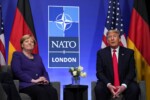Foreigners aren’t laughing at us. They pity and discount us.
Moments of national crisis ought to bring Americans together. Instead, led by a divisive president, our society is being ripped apart, as the country is battered by a once-in-a-lifetime pandemic and centuries-old pathologies of racism and inequality. The consequences of our division are profoundly troubling at home, but no less worrisome abroad.
The style and substance of our polarized politics have infected American diplomacy. Policies lurch between parties, commitments expire at the end of each administration, institutions are politicized, and disagreements are tribal. The inability to compromise at home is becoming the modus operandi overseas. In the past, a sense of common domestic purpose gave ballast to U.S. diplomacy; now its absence enfeebles it.
Partisan divides about foreign policy are hardly new. I saw my share of them as a career diplomat, from the battles over Central America policy in the Reagan era to the war in Iraq two decades later. We’ve had plenty of painful fractures, bitter policy fights, and dramatic about-faces between administrations.
But as Stanford University’s Kenneth Schultz demonstrates in an important study, partisan animus and schizophrenia are more and more the rule, not the exception. Once a regular phenomenon, Senate approval of international treaties grew ever more tenuous over the last few decades. By the Obama administration, it had become nearly impossible. Even when Bob Dole—grievously wounded in World War II, and later a Senate majority leader and GOP presidential candidate—sat in his wheelchair on the Senate floor in 2012 and asked his fellow Republicans to ratify an international disability treaty modeled on U.S. law—nearly all of them walked past him to vote nay, bent on denying Barack Obama a victory of any kind.
If that seemed like a new low in reflexive partisan opposition, President Donald Trump—as with most everything else he does—proved he could dig even deeper. He has scrapped one agreement after another, with disruptive glee and no regard for Plan B. The Iran nuclear deal (“an embarrassment”), the Paris climate accord (“very unfair”), and the Trans-Pacific Partnership (“a rape of our country”), all negotiated by the administration of his Democratic predecessor, wound up on the trash heap. New START, following the president’s exit from the Open Skies Treaty, may be next. Meanwhile, the administration is channeling General Buck Turgidson in Dr. Strangelove, threatening to resume nuclear testing and spend rivals “into oblivion” in a new arms race.
If Representative Mike Pompeo’s Benghazi hearings showed the power of weaponizing foreign policy for domestic purposes (where polarization is the end, not the means), Secretary of State Pompeo’s tenure has been marked by the weaponization of domestic politics on the world stage. The impeachment scandal—the distortion of Ukraine policy to pursue what Fiona Hill aptly termed “domestic political errands”—is not the only example, just the most dramatic.
The erosion of the bipartisan foreign-policy consensus in itself is not a tragedy, given its innumerable flaws, blind spots, and uneven track record. But the intense divisiveness and scorched-earth tactics that have poisoned our domestic politics over the past decade are crippling American diplomacy as well. The consequences are severe. Three in particular stand out.
First, America’s credibility, reliability, and reputation for competence are damaged. Credibility is an overused term in Washington, a town prone to badgering presidents into using force or clinging to collapsing positions to prop up our global currency. But it matters in diplomacy, especially when America’s ability to mobilize other countries around common concerns is becoming more crucial, in a world in which the U.S. can no longer get its way on its own, or by force alone.
If our elected representatives won’t give a negotiated agreement a fair hearing, support it, or at a minimum avoid undercutting it even before the ink dries, why would any friend or foe enter into any kind of good-faith negotiations with the U.S.? And why should they have any confidence that the American government will deliver on its commitments if they do? I remember an Iranian diplomat asking me during an especially difficult moment in the nuclear talks why he should believe that an agreement wouldn’t simply be thrown overboard in a different administration. With less than total conviction, I replied that if all parties complied with their obligations, our system would uphold it. I certainly got that wrong.
The U.S. is stuck in the mud of its own polarized dysfunction, its already-bruised reputation for getting big things done suffering badly. Others around the world have always had grievances with America’s policies and its geopolitical weight, but they usually had a grudging respect for our competence, and for the power of our example. Today, the U.S. government can’t pass a budget, let alone bring the world together to stop the spread of a ruinous pandemic. Trump once claimed that foreigners were laughing at us. The reality today is far worse—they pity and discount us.
A second effect of polarization is the demolition of diplomacy’s apolitical role. I served 10 secretaries of state. They all had finely tuned political antennae, or they wouldn’t have gotten the job in the first place. All of them, however, were scrupulous about keeping domestic politics out of foreign policy. Pompeo, by contrast, has been the most partisan secretary of state in living memory—systematically sidelining career professionals in favor of political allies, waging a war against an imagined “deep state,” relishing political skirmishes, attacking “opposition” media, stripping away safeguards (like firing the State Department’s independent watchdog last month), and barely concealing his use of the department as a platform for future political ambition.
If the world gets used to dealing with distinct brands of Democratic and Republican foreign policies, the temptation to ignore career diplomats, meddle in our politics, and wait out the clock on seemingly adversarial administrations will grow at the expense of our national interests.
Finally, leaders undercut diplomacy’s potential when the “no compromise” feature of our domestic politics becomes a feature of our diplomacy as well. I remember a story about a mistranslated U.S.-military pamphlet released over Saddam Hussein’s forces during the 2003 invasion. It mistakenly read “Surrender and die” as opposed to “Surrender or die.” The former is a pretty good slogan for much of the Trump administration’s approach to diplomatic negotiations, embodied most fancifully in its “maximum pressure” campaign against Iran.
The Trump White House is not the first to embrace lazy maximalism. That has been a ruinous habit of American diplomacy for some time. But in fanning the flames of polarization in foreign policy, the administration has done more than any of its predecessors to suffocate the potential of American diplomacy when we need it most.






Leave a Reply